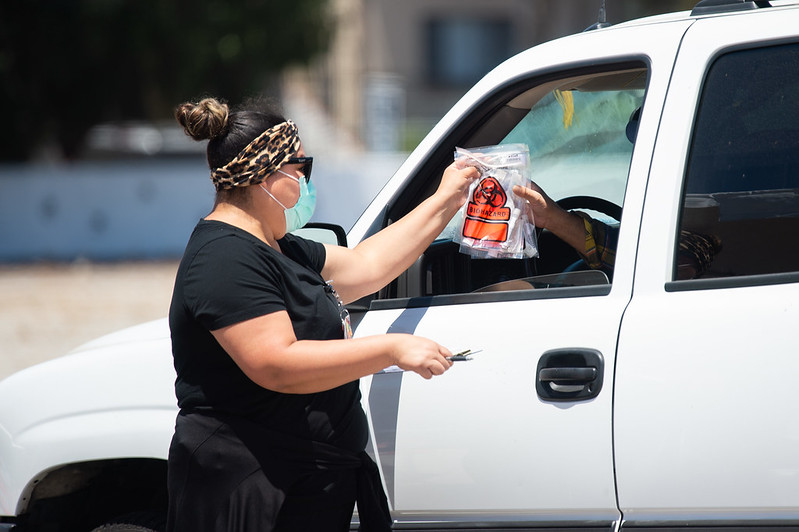
A patient is handed a test kit at a Covid-19 testing site in Panorama City. Photo credit: Los Angeles County
In an unusual move, the Food and Drug Administration issued a warning on Monday about false negative results with Curative’s Covid-19 test results.
Though the Los Angeles-based startup was only founded a year ago, several government entities are currently using its tests. Curative’s oral swab tests are offered at dozens of drive-thru testing sites across Los Angeles, and the county has also tapped the startup to help administer vaccines to nursing home residents and staff.
Curative’s tests are also used by the U.S. Air Force, and by the House and Senate to screen members of Congress for Covid-19, according to Politico.
The FDA did not specify the rate of false negatives for the test or what might be causing them, but pointed out that the test should be conducted as authorized — meaning that healthcare workers must observe patients who swab themselves, and the test should only be used for symptomatic patients.
The agency also advised healthcare providers to “consider retesting your patients using a different test if you suspect an inaccurate result was given recently by the Curative SARS-Cov-2 test.”
In an emailed statement, Curative said its test was labeled with the specific warnings and limitations shared by the FDA, and that the test’s performance and labeling have not changed.

A Deep-dive Into Specialty Pharma
A specialty drug is a class of prescription medications used to treat complex, chronic or rare medical conditions. Although this classification was originally intended to define the treatment of rare, also termed “orphan” diseases, affecting fewer than 200,000 people in the US, more recently, specialty drugs have emerged as the cornerstone of treatment for chronic and complex diseases such as cancer, autoimmune conditions, diabetes, hepatitis C, and HIV/AIDS.
The FDA gave an emergency use authorization to Curative in April for its RT-PCR test, used to detect viral RNA for SARS-CoV-2. The test could be used with a nasopharyngeal swab, a nasal swab or an oral swab, allowing for self-collection.
Even though they might be more comfortable than nasopharyngeal swabs, there are still some nuances to oral swabs. For example, people shouldn’t eat or drink an hour before the test. They also are instructed to cough before swabbing the inside of their mouth.
According to a small study conducted by Curative, self-collected oral and nasal swabs were nearly as accurate as nasopharyngeal swabs when observed by healthcare workers. But when patients swabbed themselves unobserved, the test’s accuracy fell dramatically.
Of 23 positive cases identified by a nasopharyngeal swab, only 65% were detected when patients collected a saliva sample unobserved. The study included a total of 44 people, both with and without Covid-19 symptoms.
“The data above does not support use of the Curative SARS-CoV-2, for any individuals for self-collected oral fluid samples when not directly observed and directed by a trained healthcare worker during collection and at the site of collection,” the FDA wrote in a summary of the EUA.
LA County’s Department of Health Services wrote in an email that it was aware of the FDA’s alert, and that it would review and assess results from clinical studies.
“Curative provides a limited number of tests at County-supported sites,” the department wrote in an email. “There has always been a risk of false negative results with any PCR molecular test, as the sensitivity is dependent on the concentration of viral RNA in the sample as well as how well the sample was collected. All PCR tests face the similar issues in that there is no reliable way to detect early infection or late disease.”












